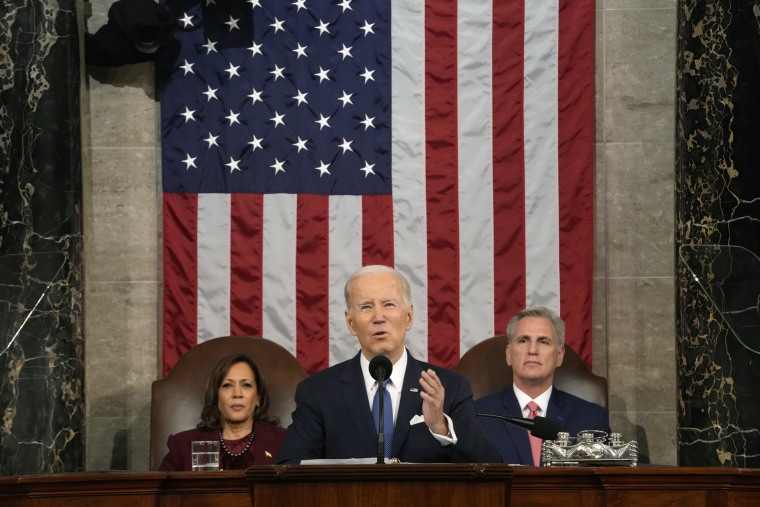Sen. Cory Booker was walking down the steps of the Capitol last month when his phone rang. It was President Joe Biden, calling to get some last-minute feedback from the New Jersey senator on a speech he would soon deliver.
Biden told Booker he planned to raise what’s known as “The Talk,” a conversation Black families have been having for generations about avoiding interactions with law enforcement that have too often escalated into violence. As the president would say in his State of the Union address just hours later, it was a conversation he never had with his own children and one that many Americans are unfamiliar with.
“Imagine having to worry like that every day in America,” Biden said.
In an interview, Booker said that what Biden first read to him over the phone and later delivered from the House chamber “was one of the more magical moments for me.”
“I didn’t just hear the lines, I could feel them,” Booker said. “As someone who had that conversation, and could feel the fear in my parents’ voices when they were trying to tell me that I could die … when he was describing that, it was emotional to me.”
Putting 'The Talk' on the national agenda
Biden’s feisty and unscripted exchange with Republicans about Social Security would dominate coverage of his speech for days. But the president’s aides and allies say his explanation of “The Talk” could prove to have greater historical impact, serving they hope as a catalyst for reframing the debate about police reforms.
“I think that what President Biden is doing is creating a real climate in which we might be able to get some things done,” said Rep. James Clyburn (D-S.C.). “That’s not to say that we’re going to get over the finish line. But it’s a good start.”
As Biden and his aides began working on his State of the Union address, they recognized a new approach was required to advance one of his top priorities. In his first address to Congress in 2021, Biden had hoped to bolster what seemed real momentum for bipartisan legislation by setting a deadline for signing it: the anniversary of the death of George Floyd. The bill never reached his desk.
Biden took a different approach a year later that reflected the political imperative of a midterm election year, emphasizing how Democrats were about funding, not defunding the police.
Policing thrust back to the forefront
But the death of Tyre Nichols, a 29-year-old Black man brutally beaten to death by Memphis police after a traffic stop, loomed large as Biden thought of how to address the issue again. And conversations with Nichols’ parents and later members of the Congressional Black Caucus, were key in shaping the remarks.
“He was terribly upset about it,” RowVaughn Wells, Nichols’ mother, said in an interview. “He also spoke about his family as well, which he knew was nothing on the scale of what I was going through.”
A White House official said Biden wanted to help other Americans understand not just how Nichols’ family felt, but all Black parents who worry about the safety of their children. Vice President Kamala Harris, meanwhile, saw a need to redefine the idea of public safety in remarks she made the week before at a memorial service for Nichols.
“When we talk about public safety, let us understand what it means in its truest form. Tyre Nichols should have been safe,” she said.
Booker, Clyburn and several other members of the Congressional Black Caucus expressed the same imperative when they met with Biden and Harris before the State of the Union, imploring him to draw on what aides have called his “superpower” of empathy to better illustrate why police reforms were necessary to enhance public safety and rebuild trust between communities and law enforcement.
“At the end of the day we all want the same thing — to go home. Law enforcement wants to go home at the end of their shift. Parents want their kids to come home from school or the park,” said Rep. Stephen Horsford (D-Nev.), the chair of the Congressional Black Caucus, who participated in the Oval Office meeting with Biden ahead of the speech.
Horsford said he caucus members were inundated with messages from constituents saying that Biden’s discussion of the Talk “made us feel seen and heard in a significant way.”
“He didn’t say it in a divisive way, he talked about all of us coming together to do what is possible,” he said.
Relationship with Black voters aids Biden's understanding
Biden may not have ever had “the talk” with his children, but the concept was familiar to him. NBC News’ Kristen Welker asked both Biden and then-President Donald Trump about it during the final 2020 debate. Biden noted his daughter, a social worker, had become especially familiar with it. But his decision to address it in his speech to Congress also reflects decades of relationships with the Black community.
“He has a level of comfort with these issues that most white people never had,” Clyburn said.
Biden’s support with Black voters was critical to his nomination and election in 2020, and will be again if he runs in 2024. This year he also became the first sitting president to speak from Atlanta’s Ebenezer Baptist Church, where Martin Luther King, Jr., once preached. And on Sunday he lead the annual commemoration of Bloody Sunday in Selma, Ala.
Biden noted he’d participated in similar anniversary marches as a senator and vice president, and talked of the importance in marking the history there again as president.
“No matter how hard some people try, we can’t just choose to learn what we want to know and not what we should know. We should learn everything — the good, the bad, the truth — of who we are as a nation. And everyone should know the truth of Selma,” he said.

